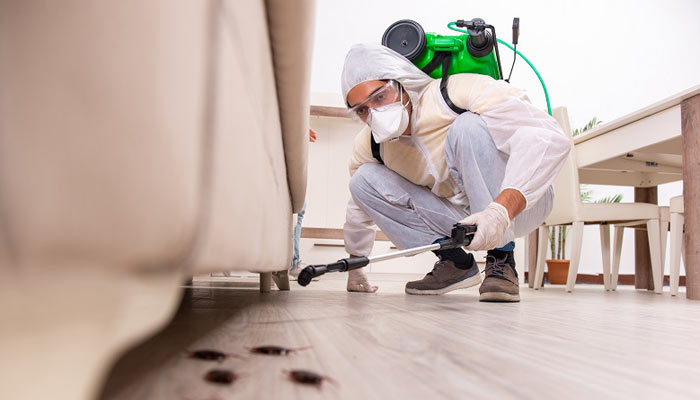Effective Insect Control Solutions: A Thorough Take A Look At Elimination Techniques and Avoidance Procedures
In the realm of insect control solutions, the successful monitoring of invasions needs a meticulous method that integrates various strategies and procedures for both obliteration and prevention. From Integrated Bug Management (IPM) methods that prioritize lasting remedies to chemical extermination techniques designed for targeted elimination, the collection versus parasites is large and diverse.

Integrated Parasite Administration (IPM) Techniques
Integrated Bug Monitoring (IPM) Techniques encompass an extensive strategy to pest control that concentrates on tracking, control, and avoidance methods to efficiently take care of pest populations. By incorporating numerous strategies, IPM aims to minimize the influence of bugs while likewise decreasing the dependence on chemical pesticides. Avoidance lies at the core of IPM, emphasizing practices like correct cleanliness, upkeep of health, and sealing access points to hinder parasites from infesting structures. Surveillance plays a critical function in IPM by frequently examining and recognizing parasite levels to establish the suitable treatment thresholds. Control approaches in IPM focus on using physical, organic, and cultural approaches before transforming to chemical treatments as a last hotel. These strategies consist of introducing natural killers, habitat adjustment, and using trapping devices to maintain pest populations in check. On the whole, IPM fosters a lasting and eco mindful method to pest monitoring, advertising long-term options that guard both human health and the ecological community.
Chemical Extermination Techniques
Chemical elimination strategies are commonly used in parasite control solutions to properly eradicate parasite populaces that posture a danger to human health and wellness and residential or commercial property. These techniques entail the usage of various chemical substances specifically made to target and remove bugs such as bugs, rodents, and other unwanted animals. The application of chemicals, insecticides, rodenticides, and other chemical representatives is meticulously managed to ensure optimum efficiency while reducing threats to human beings, animals, and the environment.
Among the crucial benefits of chemical elimination techniques is their capacity to supply quick and targeted outcomes, making them especially useful in instances of serious infestations or immediate insect control demands - a1 portland bed bug exterminator. However, it is necessary to highlight the importance of correct handling, application, and disposal of these chemical products to avoid unintentional injury
Furthermore, incorporated pest administration (IPM) approaches commonly combine chemical extermination strategies with other techniques such as hygiene, habitat alteration, and biological controls to develop a comprehensive and sustainable insect control approach. By incorporating chemical elimination strategies carefully within an IPM structure, bug control services can successfully handle pest populations while lessening possible threats to human health and the atmosphere.
Organic Pest Control Techniques
Utilizing natural predators and parasites to take care of parasite populaces is a lasting approach recognized as organic bug control. a1 commercial pest control portland. One usual organic control technique involves presenting all-natural opponents of the target pest varieties, such as ladybugs for aphid control or nematodes for termite problems.
One more effective organic control technique is making use of microbial insecticides. These are naturally taking place bacteria, such as bacteria, infections, and fungis, that specifically target and infect particular insect varieties. By making use of these microbial agents, parasite populations can be effectively lowered without hurting advantageous microorganisms or causing harm to the environment.
Physical Parasite Prevention Procedures
Applying physical pest avoidance actions entails making use of obstacles and architectural adjustments to deter parasites from getting in or infesting a residential or commercial property. Installing door moves, displays on windows, and sealing splits in the structure can assist avoid insects like insects and rats from getting gain access to indoors.
Another physical avoidance procedure is using barriers like secure fencing to keep bigger bugs such as raccoons or deer away from the residential or commercial property. Setting up mesh or cord screens around gardens can secure plants from being harmed by parasites. Appropriate waste a1 portland bed bug exterminator management, including securing garbage cans with tight-fitting lids, is essential in hindering parasites like raccoons, bugs, and rats. By carrying out these physical insect avoidance procedures, homeowner can significantly minimize the risk of bug problems and the damage they can create.
Specialist Parasite Inspection Procedures
Conducting methodical and complete parasite examinations is a basic element of expert insect management protocols. Professional parasite assessors are educated to carefully analyze properties for indicators of problems, identifying pest varieties, entrance points, and helpful conditions. The examination procedure typically begins with a comprehensive analysis of both the exterior and interior of the premises. This entails checking for insect droppings, gnaw marks, nests, and any kind of architectural damage that might suggest pest task. Furthermore, assessors may use customized tools such as dampness meters and borescopes to find covert problems within walls or crawl rooms.

Verdict
In final thought, efficient pest control solutions employ a selection of methods, consisting of Integrated Insect Monitoring methods, chemical extermination techniques, biological controls, and physical prevention actions. Expert parasite assessment treatments play a vital role in determining and addressing pest problems in a timely fashion. By carrying out a mix of these approaches, home proprietors can efficiently handle and avoid bug problems.
From Integrated Insect Administration (IPM) strategies that prioritize sustainable remedies to chemical extermination techniques created for targeted removal, the arsenal against bugs is substantial and multifaceted.Integrated Parasite Management (IPM) Techniques include a comprehensive technique to pest control that concentrates on prevention, control, and monitoring techniques to properly take care of pest populations.Chemical extermination techniques are commonly employed in pest control services to efficiently eliminate bug populations that position a risk to human health and wellness and residential property.Using all-natural predators and parasites to manage parasite populaces is a lasting technique understood as biological pest control.In conclusion, reliable pest control services employ a range of methods, consisting of Integrated Parasite Management methods, chemical extermination methods, organic controls, and physical avoidance procedures.